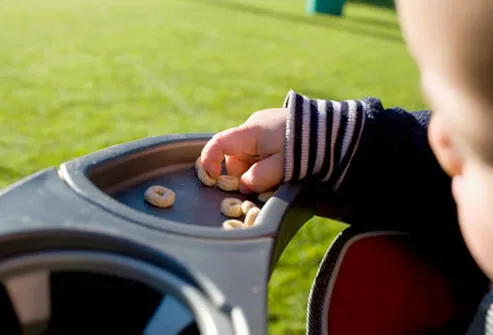Baby Food and Nutrition - What to Feed Your Baby in Year 1 - Starting Solids slideshowBaby Food and Nutrition,nutrition,food,
Baby Food and Nutrition,solid food,baby food,infant food,
Baby Food and Nutrition,feeding,baby,
Baby Food and Nutrition,baby food,baby,infant food,
Baby Food and Nutrition,food,baby
Start Solids at 4-6 Months That's the recommended time to introduce solid foods -- usually
rice cereal mixed with breast milk or formula, to start. But it's not
just about age. Before starting solids, babies should be able to sit up,
turn their heads away, and make chewing motions. And, they should be
over the "extrusion reflex" that makes them spit out anything but
liquid.
 Baby Still Needs Breast Milk or Formula
Baby Still Needs Breast Milk or Formula Babies typically don't eat a lot of solid foods right away. So
think of solids as an addition to your baby's diet, not as a replacement
for breast milk or formula. Remember, you're introducing solid foods,
not totally changing baby's diet. That will happen gradually.
 Why do most parents start with rice cereal?
Why do most parents start with rice cereal? There's no hard-and-fast rule about what solid foods you should
give your baby first. With a single-grain, iron-fortified infant cereal
-- such as rice cereal -- it may be easier to notice any food allergies
than with a cereal made from several grains. You may want to mix it with
formula or breast milk to get a runny consistency at first, until your
baby gets used to the new texture.
 Eating Solids Takes Practice
Eating Solids Takes Practice Being fed by a spoon is new to your baby. Up until now, they've
only had a liquid diet, and they'll need practice to get used to the
spoon and to the feel of having solid food in their mouth. So don't
expect them to eat a whole lot -- maybe a teaspoon or two at a time --
when you start. Instead of trying to get them to eat a certain amount,
focus on letting them get used to the experience.
 Get Started on Fruits and Vegetables, One at a Time.
Get Started on Fruits and Vegetables, One at a Time. Fruits, vegetables, grains, and even pureed meats can all be on
the menu for your baby. You may want to introduce them one at a time to
see how your baby reacts. If your baby won't eat them at first, try
again later. Tell your pediatrician about any possible allergic
reactions. Use soft baby food from a jar, or soften foods by heating or
pureeing them. Put just enough on the spoon for your baby to swallow
easily.
 Avoid Milk and Honey — for a While.
Avoid Milk and Honey — for a While. Most pediatricians recommend waiting until after baby's first
birthday to start offering cow's milk because some babies may have a
hard time digesting it before then. And, don't give honey to babies
younger than 1 year (some pediatricians say up to 2 years) because of
possible botulism risk that a baby's developing immune system can't fend
off.
 Stop When Baby's Ready to Stop
Stop When Baby's Ready to Stop Pay attention and your baby will let you know when he or she is
done eating. They might swat at the spoon, turn their head away, zip
their lips tightly, spit out whatever you put in their mouth, or cry.
Don't make them eat more than they want. Kids will eat when they're
hungry and stop when they're full. Honoring those instincts may help
them avoid overeating now and when they get older.
 Got a Fussy Eater? Don't Fret.
Got a Fussy Eater? Don't Fret. Just because your baby doesn't immediately like a new food doesn't
mean he never will. Wait a few days and try again. It may take your
child more than a couple of times before giving a new food a chance.
Remember, you're a role model, so your baby may be more interested in
foods they see you eating and enjoying. But again, don't force your
child to eat, and don't make a big deal about new foods.
 Things Won't be Tidy. That's OK.
Things Won't be Tidy. That's OK. As your baby grows, he'll try to feed himself. Chances are, a good
bit of food is heading for their face, hands, hair, bib, clothes, or
high chair tray -- not to mention you or any surfaces within flinging
range. Learning to eat solid food is a full-body, tactile experience for
your baby. Put a mat underneath baby's highchair to catch some of the
mess, dress accordingly, and be patient -- this phase won't last
forever.
 Try Finger Foods When Baby's Ready
Try Finger Foods When Baby's Ready Around 9 months or so, your baby will be able to pick up small
pieces of soft table food to eat. You'll still need to spoon-feed for a
while, and continue formula or breast milk. Some great "finger foods"
include ripe banana pieces, cooked chunks of carrots, cottage cheese,
well-cooked pasta, dry cereal, and scrambled eggs. Avoid choking hazards
like hard candy, chips, raw vegetables, grapes or raisins, hard cheese,
and whole hot dogs.
 thanks...
thanks...
the best for your baby

Top 100 Baby Purees: 100 Quick and Easy Meals f...
by Annabel Karmel
4.3 out of 5 stars (210)
$9.20
- PRESS HERE

The Complete Idiot's Guide to Fee...
by M.S., R.D., Elizabeth...
4.1 out of 5 stars (20)
$11.51
- PRESS HERE

Super Baby Food
by Ruth Yaron
3.9 out of 5 stars (728)
$14.73
- PRESS HERE

Cooking for Baby: Wholesome, Homemade,...
by Lisa recipes by Barnes
4.4 out of 5 stars (61)
$12.18
- PRESS HERE

Starting Solids: The essential guide to your ba...
by Annabel Karmel
4.3 out of 5 stars (3)
$10.88
- PRESS HERE

SuperFoods: For Babies and Children
by Annabel Karmel
4.2 out of 5 stars (41)
$12.23
- PRESS HERE



